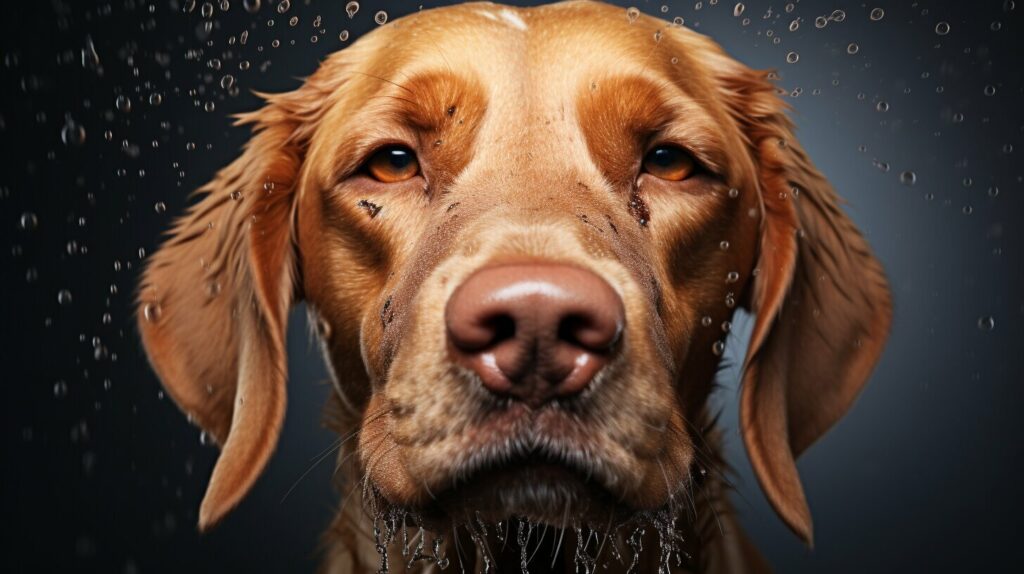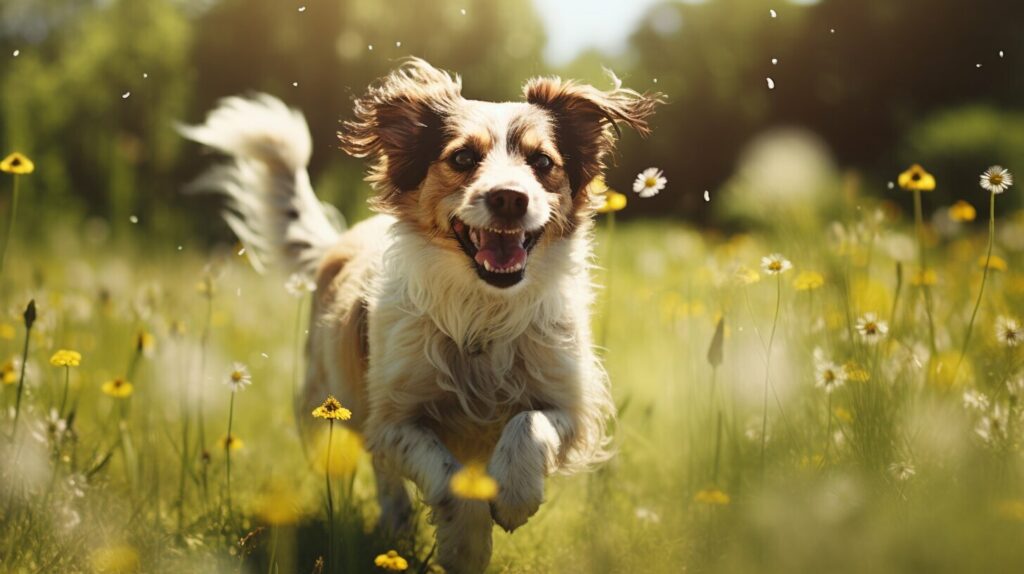If you’re a dog owner, you may have noticed that your furry friend’s nose can vary in texture and moisture levels. While a moist nose is generally considered a sign of good health, a dry nose can be a cause for concern. In this article, we’ll explore the causes of dry noses in dogs and provide solutions to help keep your pup’s sniffer healthy.
Key Takeaways:
- A dry nose in dogs can be a sign of health issues or environmental factors.
- Proper nose care is important for your dog’s overall well-being.
- Natural remedies and moisturizers can help alleviate dry noses in dogs.
- Identifying the underlying cause of nose peeling is crucial for appropriate treatment.
Causes of Dry Noses in Dogs
There are several potential causes of dry noses in dogs. These can range from external factors to underlying health issues. It is important to identify the cause in order to implement appropriate solutions.
External Factors
Weather conditions can have a significant impact on your dog’s nose. During dry and hot weather, the air can be devoid of moisture, drying out your dog’s nose. Similarly, very cold weather can also cause the nose to dry out. In addition, exposure to the sun can also contribute to dryness.
Another external factor that can contribute to dry noses is contact dermatitis. This occurs when your dog’s nose comes into contact with an irritating substance, such as plastic or harsh cleaning products.
Health Issues
There are several health issues that can cause dry noses in dogs. One common cause is dehydration, which can occur due to insufficient water intake or illnesses that cause vomiting or diarrhea. Certain medical conditions, such as hypothyroidism and Cushing’s disease, can also cause dry noses. In addition, some medications can have the side effect of drying out your dog’s nose.
Nose peeling is another common issue that can occur as a result of dry noses. This can be due to a variety of causes, including allergies, fungal infections, and autoimmune diseases.
It is important to consult with your veterinarian if you notice persistent dryness or peeling of your dog’s nose. They can perform a thorough examination and determine the underlying cause of the dryness.
Understanding the Importance of Dog Nose Care
As a responsible pet owner, it’s crucial to prioritize your dog’s nose care. A healthy nose is essential for your dog’s overall well-being, and neglecting it can lead to various health issues. To ensure your furry friend’s good health, let’s take a closer look at why dog nose care is so important and how you can maintain it.
Firstly, a dog’s nose serves many purposes, including sense of smell, temperature regulation, and humidity control. A dry or cracked nose can impair your dog’s ability to perform these functions, leading to discomfort and even infection. Therefore, maintaining a healthy, moist nose is vital for your dog’s physical and mental health.
Secondly, regularly checking and cleaning your dog’s nose can help detect any potential health issues before they become severe. For instance, a dog’s nose can reveal signs of allergies, infections, or tumors. Early detection can make all the difference in the treatment and recovery process.
So, how can you maintain your dog’s nose health and prevent dryness or cracking? Here are some simple tips:
- Keep your dog hydrated by ensuring they have access to clean, fresh water at all times.
- Use a humidifier or add moisture to the air in dry weather conditions.
- Wipe your dog’s nose with a damp cloth to remove any dirt, dust, or debris.
- Avoid exposing your dog to harsh chemicals or irritants, such as cleaning products or cigarette smoke.
- Consider using a natural dog nose balm or moisturizer to promote healing and prevent dryness.
By following these simple dog nose care tips, you can help ensure your furry friend’s nose stays healthy and moisturized. Regular maintenance can also help detect any potential health issues early on, leading to a happier, healthier life for your dog.
Dog Nose Moisturizers and Balms
If your dog is suffering from a dry nose, you may want to consider using a moisturizer or balm to help relieve their discomfort. Dog nose moisturizers and balms can be effective in promoting healing and restoring moisture to your dog’s dry nose.
There are various types of dog nose moisturizers and balms available on the market. Some are made with natural ingredients, while others are synthetic. When choosing a product, it is essential to consider the ingredients and ensure that they are safe for your dog. Be sure to read the label carefully and research the ingredients to ensure they are non-toxic.
When applying a dog nose moisturizer or balm, it is important to use a gentle touch. Apply a small amount to the affected area and gently rub it in. Do not use too much or apply too frequently as it can cause irritation. Always follow the product instructions for best results.
One popular ingredient in dog nose moisturizers and balms is shea butter. Shea butter is renowned for its moisturizing properties and can be particularly effective in treating dry, cracked noses. Another common ingredient is coconut oil, which is also known for its moisturizing and healing properties. Beeswax is another ingredient used in some dog nose balms for its protective qualities.
Overall, using a dog nose moisturizer or balm can help provide relief for a dry nose and promote healing. Be sure to choose the right product for your dog and use it according to the instructions for best results.
Natural Remedies for Dry Noses in Dogs
If your dog suffers from a dry nose, you may be wondering what you can do to provide them with relief. While commercial dog nose balms and moisturizers can be effective, there are also natural remedies you can try that are safe and gentle on your furry friend.
1. Coconut oil: A popular remedy for dry noses in dogs, coconut oil is a natural moisturizer that can help soothe and heal cracked and dry noses. Simply apply a small amount to your dog’s nose and massage gently. Repeat a few times a day as needed.
2. Olive oil: Another natural oil that can be beneficial for a dry dog nose is olive oil. It can help moisturize and nourish the skin while providing a protective barrier against harsh environmental elements. Apply a small amount to your dog’s nose and massage gently.
3. Aloe vera: Known for its soothing and healing properties, aloe vera can be used to help heal dry, cracked noses in dogs. Simply apply a small amount to your dog’s nose and massage gently. Be sure to use 100% pure aloe vera gel with no added preservatives or chemicals.
4. Vitamin E oil: Rich in antioxidants, vitamin E oil can help moisturize and heal your dog’s dry nose. Apply a small amount to your dog’s nose and massage gently. Be sure to use a natural, pure form of vitamin E oil without any added ingredients.
5. Honey: A natural antibacterial and anti-inflammatory, honey can help soothe and heal a dry dog nose. Apply a small amount to your dog’s nose and massage gently. Be sure to use raw, unpasteurized honey to ensure maximum benefits.
Remember to always consult with your veterinarian before trying any new remedies on your dog. While natural remedies can be safe, some dogs may have allergies or other health conditions that could be aggravated by certain ingredients.
How to Treat Dry Noses in Dogs
Proper care and treatment are essential when it comes to your dog’s dry nose. Here are some practical steps you can take to help alleviate their discomfort:
- Cleanse: Gently clean your dog’s nose with a soft, damp cloth or a mild pet-friendly cleanser. Avoid using any harsh chemicals that could irritate the skin further.
- Moisturize: Apply a pet-safe nose moisturizer or balm to your dog’s nose. This will help to soothe the dry skin and promote healing. Be sure to choose a high-quality product that is free from harmful chemicals.
- Maintain hydration: Dogs should have access to fresh water at all times. Ensure that your dog is drinking enough water to stay hydrated. This will help to avoid dehydration, which can cause further dryness of the nose.
- Adjust the environment: If your dog’s dry nose is caused by environmental factors, such as dry air or excessive sun exposure, make appropriate adjustments. Consider using a humidifier in your home or keeping your dog in the shade during hot weather.
- Consult your veterinarian: If your dog’s dry nose persists or is accompanied by other symptoms, such as discharge or bleeding, consult your veterinarian. They can help to identify any underlying health issues and recommend appropriate treatment.
Remember, prevention is key when it comes to your dog’s nose care. Regular cleaning and moisturizing can help to prevent dryness and other related issues. By taking the necessary steps to care for your dog’s nose, you can help them to stay healthy and happy.
Dog Nose Peeling: Causes and Treatments
If you’ve noticed your dog’s nose peeling, it can be a concerning sight. Knowing the possible causes and appropriate treatments can help you address the issue and prevent further complications.
Possible Causes of Dog Nose Peeling
Dog nose peeling can be caused by various factors, including:
- Exposure to extreme temperatures
- Sunburn
- Allergic reaction to food or environmental triggers
- Fungal or bacterial infection
- Autoimmune disorders
- Underlying health conditions
It’s essential to identify the underlying cause before attempting any treatment. If the condition persists or worsens, consult your veterinarian for proper diagnosis and treatment.
Appropriate Treatments for Dog Nose Peeling
The appropriate treatment for dog nose peeling depends on the underlying cause. Here are some options:
Tip: Don’t apply any over-the-counter ointments or creams without consulting your veterinarian first. Some products may contain harmful ingredients that can worsen the condition.
For mild cases:
For minor cases of dog nose peeling, here are some treatments you can try:
| Treatment | Instructions |
|---|---|
| Moisturize the nose | Apply a dog nose balm or petroleum jelly to keep the nose moisturized and prevent further peeling. |
| Avoid sun exposure | Avoid exposing your dog to direct sunlight, especially during peak hours. |
| Change diet or environment | If the peeling is due to an allergy, identify and eliminate the trigger from your dog’s diet or environment. |
For severe cases:
If the peeling is severe or accompanied by other symptoms, such as bleeding or discharge, it’s best to seek veterinary care. The veterinarian may recommend topical or oral medication, such as antibiotics or antifungal agents, or in severe cases, surgery.
Overall, dog nose peeling can be a concerning issue, but with proper identification of the underlying cause and appropriate treatment, you can help your furry friend recover and prevent further complications.
Dry Dog Nose Treatment Options
If your dog is suffering from a dry nose, there are several treatment options available. It is important to identify the underlying cause before selecting a treatment to ensure the most effective solution.
Conventional Treatments
Conventional treatments for dry noses in dogs typically include the application of dog nose moisturizers and balms. These products work by providing moisture to the nose and promoting healing.
When selecting a dog nose moisturizer or balm, look for natural ingredients such as shea butter, coconut oil, or beeswax. Avoid products that contain artificial fragrances or chemicals as they may irritate your dog’s nose further.
In some cases, veterinarians may prescribe medications to treat underlying health issues that are causing the dry nose.
Alternative Treatments
Alternative treatments for dry noses in dogs include natural remedies such as applying aloe vera gel, honey, or coconut oil to the nose. These remedies can provide relief and promote healing, but it is important to follow appropriate precautions.
Acupuncture and massage therapy may also be effective in treating underlying health issues that contribute to dry noses in dogs.
Preventing Dry Noses in Dogs
Prevention is key when it comes to dry noses in dogs. Regular nose care can help prevent dryness and promote overall health. Keep your dog’s nose clean and free of debris, and provide ample water to prevent dehydration.
In addition, consider using a humidifier in your home, especially during dry winter months, to help keep your dog’s nose moist.
By selecting the appropriate treatment and taking steps to prevent dry noses, you can keep your dog’s nose healthy and comfortable.
Finding the Right Solution for Your Dog’s Dry Nose
When it comes to finding the right solution for your dog’s dry nose, there are several factors to consider. Each dog is unique, and what works for one may not work for another. As you explore remedies and treatments, keep in mind your dog’s breed, age, and overall health.
Start by identifying the potential cause of the dry nose. If it’s due to external factors, such as dry weather or sun exposure, you may want to try a dog nose balm or moisturizer. These products can help restore moisture and provide a barrier against further damage.
If the cause is medical, it’s essential to consult with your veterinarian before trying any treatments. They can help identify any underlying health issues and offer appropriate treatment options.
Natural remedies can also be a helpful solution for dry noses in dogs. For example, applying coconut oil or aloe vera gel can help soothe and moisturize the nose. However, it’s important to research each remedy and ensure they are safe for your dog and won’t cause any adverse reactions.
As you explore different remedies and treatments, be patient and monitor your dog’s progress. Different solutions may take varying amounts of time to show results, and it’s essential to give each approach enough time before moving on to the next. Make sure to follow the instructions carefully and take any necessary precautions.
Ultimately, finding the right solution for your dog’s dry nose can take time and experimentation. By taking a comprehensive approach and considering all factors, you can help ensure your dog’s nose stays healthy and happy.
Conclusion
Caring for your dog’s nose is an essential part of their overall health and wellbeing. Understanding the causes of dry noses in dogs and finding effective solutions can prevent discomfort and potential health issues.
Remember to prioritize regular dog nose care, including cleaning and moisturizing. Consider using dog nose moisturizers and balms or natural remedies to alleviate dryness. If your dog’s dry nose persists or is accompanied by other symptoms, consult your veterinarian for appropriate treatment options.
By implementing proper care routines and finding the right solution for your dog’s individual needs, you can help keep their nose healthy and them happy and comfortable.
FAQ
Q: What causes dry noses in dogs?
A: Dry noses in dogs can be caused by a variety of factors, including weather conditions, allergies, dehydration, and certain health conditions. It is important to identify the underlying cause to effectively treat and prevent dry noses in dogs.
Q: Why is dog nose care important?
A: Proper dog nose care is essential for a dog’s overall well-being. A healthy nose helps dogs regulate body temperature, detect scents, and communicate. Regular maintenance, such as keeping the nose moisturized and clean, can prevent dryness and protect against infections.
Q: How can I moisturize my dog’s dry nose?
A: There are various dog nose moisturizers and balms available that can help moisturize and heal dry noses in dogs. Look for products specifically designed for dogs and apply them according to the manufacturer’s instructions. Be sure to choose natural and safe ingredients to avoid any potential irritations.
Q: Are there any natural remedies for dry noses in dogs?
A: Yes, there are natural remedies that can help alleviate dry noses in dogs. Some common household items, such as coconut oil or aloe vera gel, can be applied to the nose to provide relief. However, it is important to consult with your veterinarian before trying any natural remedies.
Q: How should I treat my dog’s dry nose?
A: Treating a dog’s dry nose involves a combination of moisturizing, cleaning, and providing proper hydration. Establish a regular care routine that includes applying dog nose moisturizers, gently cleaning the nose with a damp cloth, and ensuring your dog drinks enough water. If the dryness persists or worsens, consult a veterinarian.
Q: What causes dog nose peeling?
A: Dog nose peeling is often a result of dryness and can be caused by factors such as sunburn, allergies, or underlying health conditions. It is important to identify the cause to determine the appropriate treatment for your dog’s nose peeling.
Q: What treatment options are available for dry noses in dogs?
A: There are various treatment options for dry noses in dogs, including using dog nose moisturizers, balms, or natural remedies. In some cases, medication may be necessary if the dryness is due to an underlying health condition. Consult with your veterinarian to determine the best treatment approach for your dog.
Q: How do I find the right solution for my dog’s dry nose?
A: Finding the right solution for your dog’s dry nose involves considering factors such as your dog’s breed, age, and overall health. It is important to consult with your veterinarian for personalized recommendations. Additionally, trial and error may be necessary to find the most effective solution for your dog.



